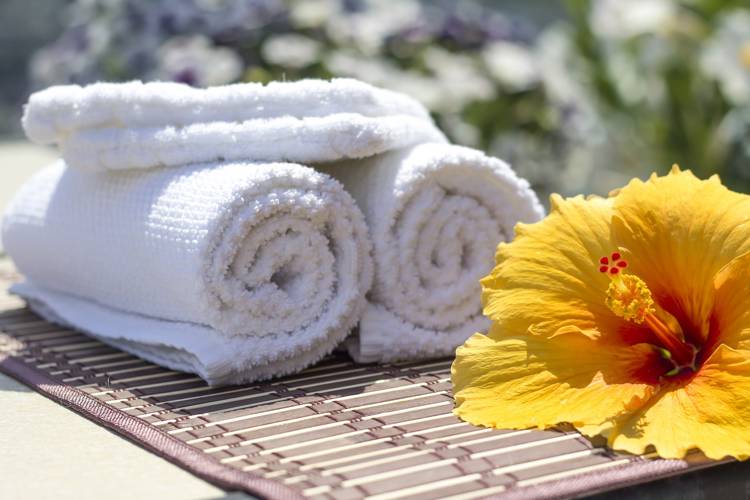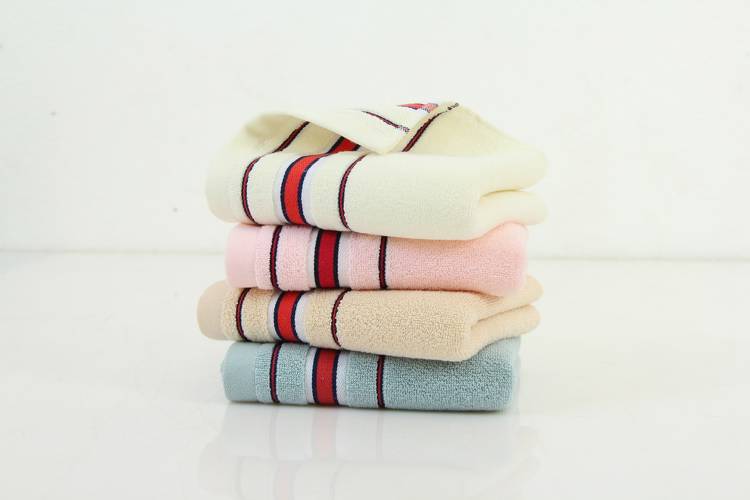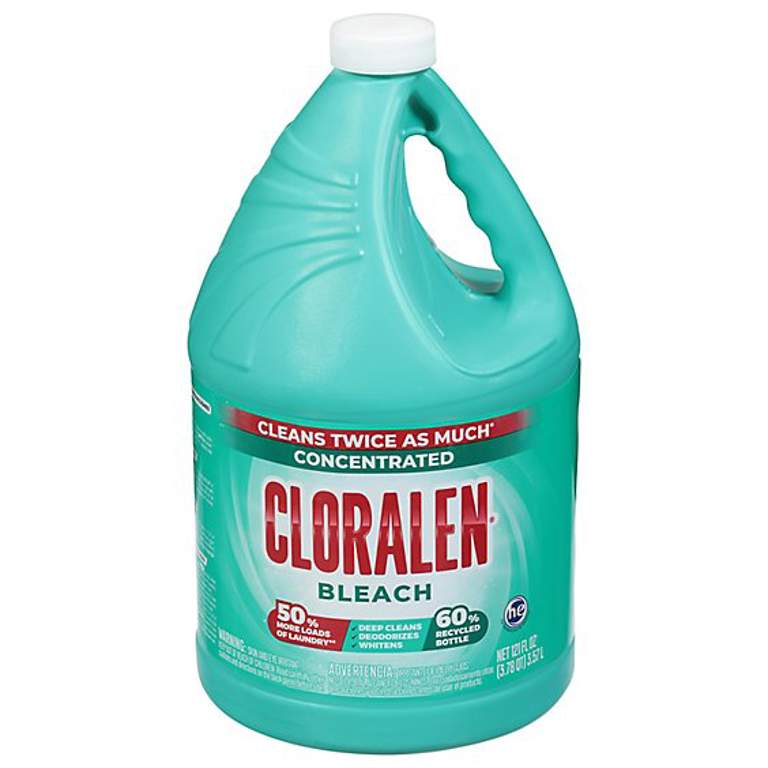Laundry Deep Cleaning: How to Disinfect Clothing
Bestsellers for Bleach
Keeping your clothes clean is one thing, but ensuring they're free from bacteria and viruses? That's a whole other level of laundry mastery. Whether you've been sick recently, are the parent of a potty-training child, or just want to give your wardrobe a deep cleanse, understanding when and how to disinfect clothing (and your washing machine) can make all the difference. So grab your detergent; we're about to get into the nitty-gritty of keeping everything in your laundry cycle as fresh as possible.
Laundry Deep Cleaning
 Regular laundry routines and deep cleaning laundry routines serve different purposes. Here's what you need to know about each.
Regular laundry routines and deep cleaning laundry routines serve different purposes. Here's what you need to know about each.
Regular Laundry
Regular laundry is the routine process we undertake, typically weekly, to clean our clothes from daily wear. This involves using a standard washing cycle with detergent which effectively removes surface dirt and minor stains, keeping clothes fresh for regular use.
Laundry Deep Cleaning
Deep cleaning laundry, on the other hand, is a more intensive process that aims to remove stubborn stains, odors, and built-up grime that regular washing can't tackle. It often involves pre-treating stains, soaking items in a specialized cleaning solution, and using a longer, more intense washing cycle. Deep cleaning may also include adding boosters or using specific detergents designed for deep cleaning tasks to ensure thorough cleanliness.
While regular laundry is part of our weekly routine, deep cleaning doesn’t need to happen as frequently. It's recommended to deep clean items such as bed linens, towels, and heavily soiled garments every three to six months or when you notice persistent odors or stains that don’t come out with regular washing.
Incorporating both practices into your home care routine ensures that your textiles stay fresh, clean, and in good condition for longer periods.
When Does Laundry Need to Be Sanitized?
Knowing when your laundry needs a sanitizing boost is key to maintaining a healthy home environment. It's not just about the visible stains or dirt; it's also about what you can't see. Germs, bacteria, and viruses can linger on fabrics, posing risks to you and your family. Here are some situations where sanitizing your laundry becomes essential:
- After illness: If someone in your household has been sick, sanitizing their clothes, bed linens, and towels can help prevent the spread of germs.
Post-workout gear: Sweaty gym clothes are breeding grounds for bacteria. Sanitizing them after each use keeps things fresh and hygienic.
Handling raw food: Clothes that have come into contact with raw meat or fish should be sanitized to avoid cross-contamination.
Pet accidents: If pets have soiled clothing or bedding, sanitizing these items can eliminate odors and bacteria.
Seasonal cleaning: Giving your wardrobe a seasonal deep clean helps remove lingering germs and prepares clothes for storage.
In each of these scenarios, using the right detergent and washing settings can significantly improve the cleanliness of your laundry and keep it safe from harmful microorganisms. Next, we'll explore how to maintain your washing machine to support a thorough cleaning process.
How to Remove Viruses, Bacteria, and Allergens From Your Laundry

You'll need to follow a few key steps to achieve that deep clean and ensure your clothes are clean and disinfected. Here's how to ensure your laundry routine is up to the task.
Use the right detergent: Opt for a detergent designed to kill bacteria and viruses. This ensures that your clothes are cleaned and sanitized.
Hot water is your friend: When possible, wash your clothes in hot water. High temperatures help kill most germs and provide an extra layer of cleaning.
Remember bleach: Adding bleach can be an effective way to disinfect whites. Just be sure to use it safely and according to the product instructions.
Consider a laundry sanitizer: If you're washing colors or delicate items that can't handle bleach or high temperatures, add a laundry sanitizer. These products are designed to kill germs even in cold water.
Dry on high heat: Germs love moisture, so make sure your clothes are completely dry before folding them away. Using a high heat setting on your dryer can also help eliminate any lingering bacteria.
Remember, these steps are especially important if someone in your household has been sick or if you're trying to reduce allergens like dust mites. By incorporating these practices into your laundry routine, you're not just cleaning your clothes—you're taking an important step towards keeping your home healthy and safe.
How and When to Disinfect Your Washing Machine
It may be surprising to hear, but your washing machine can harbor germs, bacteria, and mold which may transfer to your clothes. Just like any other appliance, it needs regular maintenance and cleaning to perform its best. Neglecting this can lead to unpleasant odors and dingy clothes. Here's how and when you should disinfect your washing machine to keep it in top shape.
Regular cleaning schedule: Aim to clean your washing machine at least once a month. This prevents the buildup of dirt, grime, and detergent residues that can harbor bacteria and mold.
After washing heavily soiled items: If you've washed clothes that were exceptionally dirty or contaminated (think post-illness bed linens or heavily soiled work uniforms), run an empty hot wash cycle with a washing machine cleaner right after.
Use the right cleaner: Opt for a cleaner specifically designed for washing machines. This ensures that it effectively targets and removes the buildup without damaging your machine.
Don't forget the lint trap: Clean out your dryer's lint trap after every load. A clogged lint trap not only affects drying efficiency but can also contribute to musty smells.
Leave the door open: After each use, leave the washing machine door and detergent tray open to air out. This simple step helps prevent mold and mildew from forming in a damp environment.
Wipe down gaskets: Using a damp towel, wipe down gaskets and seals to remove any built-up residue or mold.
By incorporating these practices into your routine, you're not just ensuring that your clothes come out smelling fresh; you're also extending the life of your washing machine. Remember, a clean washer means cleaner clothes.
FAQ

Can I use vinegar as a natural fabric softener and disinfectant?
Vinegar can serve as a natural fabric softener. To disinfect, it's more effective when combined with other methods such as hot water washing, as vinegar alone may not kill all types of bacteria and viruses.
How often should towels be washed to stay sanitary?
Towels should be washed after three uses to prevent bacterial growth and maintain hygiene. If you live in a humid environment and they don't quickly air dry, you may need to wash your towels after each use to prevent musty odors from developing.
Is it safe to mix laundry sanitizer with any detergent?
Most laundry sanitizers are safe to use with detergents. Always read the sanitizer's instructions to ensure compatibility with your detergent and machine.
Can sun drying help disinfect clothes?
Sun drying offers mild disinfectant properties due to UV light exposure. It's beneficial for items that can withstand direct sunlight without fading.
What temperature kills most germs in the laundry?
Washing at temperatures of 140°F or higher is effective in killing most germs.
How should I wash heavily soiled children’s clothes?
Remove any debris with a toothbrush or rough towel. Then, rinse the item with cold water, pre-treat stains, and wash using the hot water setting safe for the fabric, along with a disinfectant product if the fabric color allows.
Is pre-soaking necessary for disinfecting laundry?
Pre-soaking isn’t always necessary but can help loosen dirt and reduce germs before washing, especially in heavily soiled items.
How to disinfect laundry without damaging sensitive fabrics?
Use a disinfectant suitable for cold water and choose the gentle cycle on your washing machine to protect delicate fabrics.
Can hand-washed clothes be effectively disinfected?
Yes, use hot water where possible and a disinfectant, ensuring you handle hot water safely when hand washing.
What's the best way to clean and disinfect pet bedding?
Wash pet bedding separately using hot water and a pet-safe disinfectant or detergent, and ensure it's completely dry before use.
Can essential oils help disinfect laundry?
Some essential oils have natural antibacterial properties, but they should be used in conjunction with other disinfecting methods for effectiveness.
How to maintain freshness in front-load washers?
Regularly clean the gasket and detergent dispensers and leave the door open after each wash to dry out the machine.
Is it necessary to disinfect clothes after visiting public places like grocery stores?
While not always necessary, disinfecting clothes can reduce the risk of bringing germs into your home, especially during flu season or in high-risk environments.
How do I prevent cross-contamination between dirty and clean laundry?
Use separate baskets or bags for dirty and clean laundry and always wash your hands after handling dirty clothes.
What to do if laundry detergent causes skin irritation?
Switch to a hypoallgenic detergent formulated for sensitive skin, and ensure clothes are thoroughly rinsed during the wash cycle.
Safeway Buying Guide

Cloralen Concentrated - 121 FZ
- Cloralen Concentrated is a bleach that cleans twice as much area, whitens, deodorizes and gives 50% more loads of laundry than the regular Cloralen bleach. Additionally, it is formulated for use in standard and HE machines, is made with 60% recycled bottle and can be used for stain removal. With its deep cleaning capabilities it will leave your home sparkling clean!
- Highly concentrated formula that provides powerful cleaning
- Effective in eliminating tough stains and dirt
- Provides a fresh and clean scent after use
- Versatile - can be used on a wide range of surfaces
- Large quantity (121 FZ) ensures long-lasting use
- Simple to use with clear, easy-to-follow instructions
- Users appreciate its affordable price for the value it provides
Clorox Regular Splashless Disinfecting Bleach Bottle - 77 Fl. Oz.
Clorox Regular Splashless Disinfecting Bleach Bottle offers a controlled pour with less spilling and splashing, killing 99.9% of bacteria and viruses for a powerful clean. This bleach liquid whitens, brightens, deodorizes and provides 10X deep cleaning benefits to remove tough stains from white clothing. It is easy to pour and handle, perfect for everyday cleaning in both standard or HE washers. Also, the product is made in the USA of global components.
- Kills 99.9% of germs and bacteria, ensuring a clean and safe environment.
- Splashless design makes it easy and safe to use, reducing the risk of spills and accidents.
- Comes in a convenient 77 Fl. Oz. bottle, providing ample quantity for extensive cleaning.
- Regular variant provides consistent, reliable results with every use.
- Can be used on a variety of surfaces, making it a versatile cleaning solution.
- The product is from Clorox, a trusted brand known for its high-quality cleaning products.
- Easy to use with clear instructions, making it suitable for both home and professional use.
Signature Select Bleach Low Splash Regular - 121 FZ
This product, Signature Select Bleach Low Splash Regular - 121 FZ, is a concentrated cleaner that deodorizes and brightens laundry. It is 100% guaranteed for quality and satisfaction or your money back.
This product has many positive features. It is a concentrated cleaner that effectively deodorizes and brightens laundry for standard and HE washers. It also comes with a 100% money back guarantee, so you can be sure of its quality and satisfaction. Additionally, it comes with helpful instructions for both laundering and cleaning, so you can get the best results from the product. Moreover, it contains safety warnings to ensure that it's used safely.
- Signature Select Bleach offers a low splash feature, making it easier and safer to use without worrying about accidental spills.
- The product comes in a substantial 121 FZ size, providing excellent value for money.
- Users appreciate its regular scent, which is not too overpowering yet effectively masks unpleasant odors.
- It has been praised for its high effectiveness in cleaning and disinfecting surfaces, making it a reliable choice for maintaining hygiene.
- The bleach is also appreciated for its versatility, as it can be used on a wide range of materials and surfaces.
- Customers have noted that the bleach does not leave any residue after use, ensuring a clean and tidy finish.
- Many users have mentioned the product's easy-to-use packaging, which further enhances the overall user experience.

























